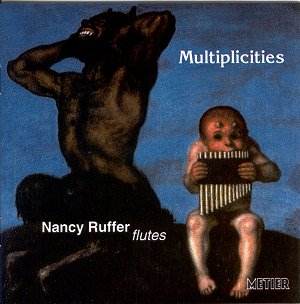An ambitious survey of late twentieth century
pieces for solo flute, this disc represents my second recent encounter
with top American flautist Nancy Ruffer. As with her contribution
to the outstanding
CD of John Hawkins' music on Meridian, she again gives the
distinct impression that she could soon attain the status of a
Jeffrey Khaner or Jennifer Stinton. I think she has succeeded
very well in putting together a diverse programme of the challenging
and the more accessible, while including several works commissioned
by or dedicated to her.
Brian Ferneyhough is something of a bête-noir
in some musical circles and often pigeonholed with the equally
misunderstood Birtwistle but his short(ish) Superscriptio
is almost charming and reminded me, among other things, of Jan
Garbarek's early improvisations on Scandinavian wood flute (Silje?).
Despite hardly being easy listening, not a great deal of musical
barbed wire is in evidence anyway! Jason Eckardt's "title track"
continues the experimental jazz parallel, but a little more conventional
than Ferneyhough and certainly more reminiscent of Messiaen than
Birtwistle - natural rhythms and harmonies seem to loom large
in this piece. Henry Cowell is one of my favourite American composers
and never seems to be afforded his real, deserved significance.
Here, The Universal Flute shows him in the mode in which
he most influenced Lou Harrison and Hovhaness, with a beautiful
Japanese shakuhachi tune. Wonderful!
James Dillon's Sgothan is probably the
least immediately approachable piece on the disc, complex and
of an extended duration. The booklet notes mention the composer's
fascination with Indian music and I would concur that this is
certainly not a Short ride in a Fast Machine! The more
concise Diffraction follows later, less convoluted but
rather more abrasive. Chris Dench's intervening work provides
some (relatively) light relief with his ten minute piece again
echoing Garbarek's, and before him Don Cherry's interest in shamanic
influences, the difference being a certain introspection here
replaced in the "jazz" composers' work by hypnotic rhythms.
The last Metier CD I reviewed was Michael Finnissy's
excellent Lost
Lands. Here the inspiration is Australian indigenous culture
rather than the Balkans or Kurdistan but the effect is equally
gratifying. I do find some of this composer's piano music rather
daunting but his works for other instruments, either solo or in
chamber ensemble, come across, as in this case, as rather haunting
and actually quite accessible for those willing to listen. Ulpirra
is incredibly atmospheric and matches the inspirations of the
great Antipodean composers (e.g. Sculthorpe) in its evocation
of the mystery and magic of the interior. Michael Parkin's Elegy
also draws on tribal music, this time that of African pygmies,
and again to wonderful effect. Meditative but also bluesy, this
piece, along with the Cowell, represents the most accessible and
overtly attractive music here, and Ruffer's occasional vocalisations
merely enhance the real sense of being somewhere far away. Superb
stuff!
Simon Holt's closing Maïastra is
named in deference to a large, mythical bird and a Brancusi sculpture
of similar provenance. It is a long piece, more immediate than
the Dillon but still a rather involved listen, a suitable summation
of what has gone before but not one of the real highlights. This
disc will no doubt be essential listening for flautists engaged
with the contemporary music scene. I loved the Cowell, Parkin
and Finnissy pieces but would not expect to revisit the others,
good though they are, on a regular basis. The performances are
as authoritative as it gets!
Neil Horner
